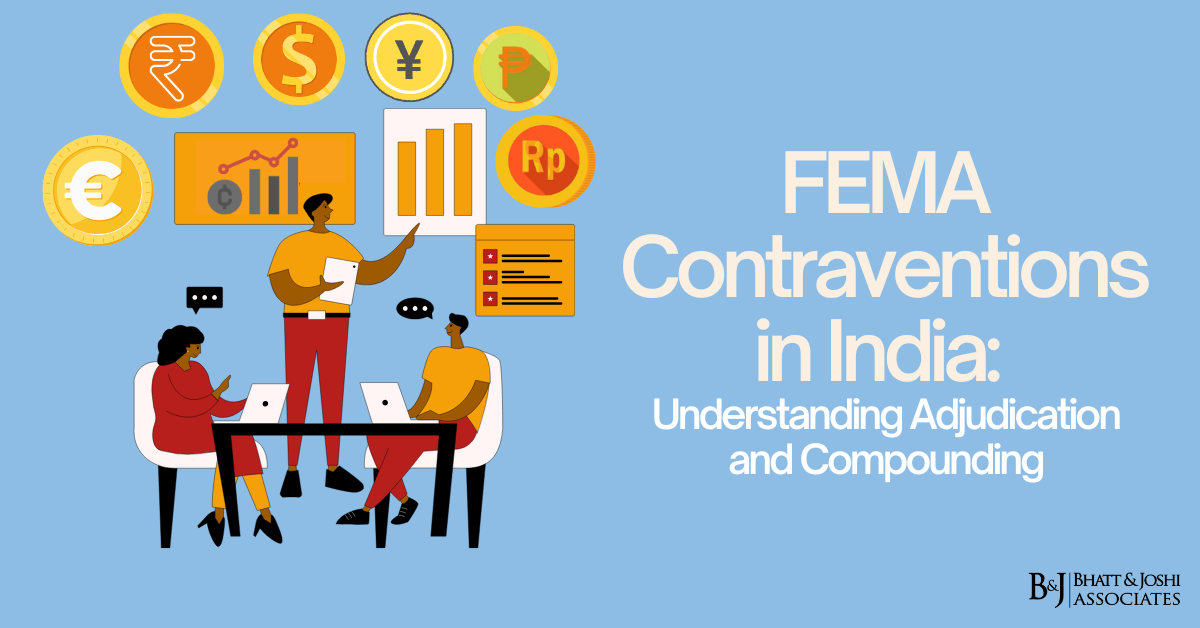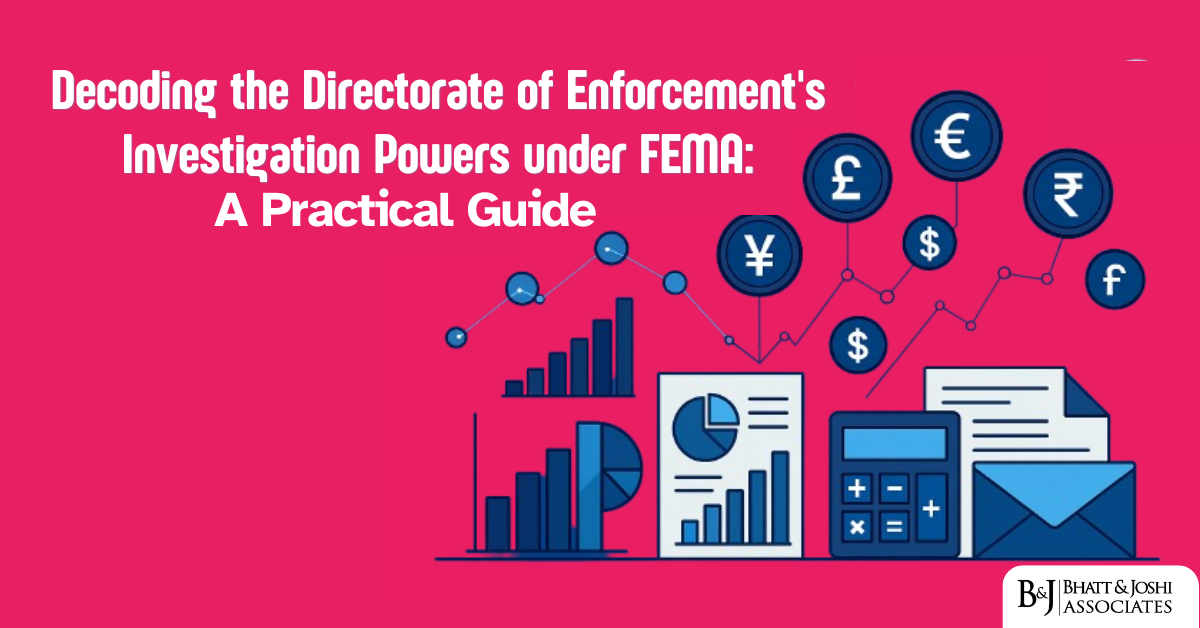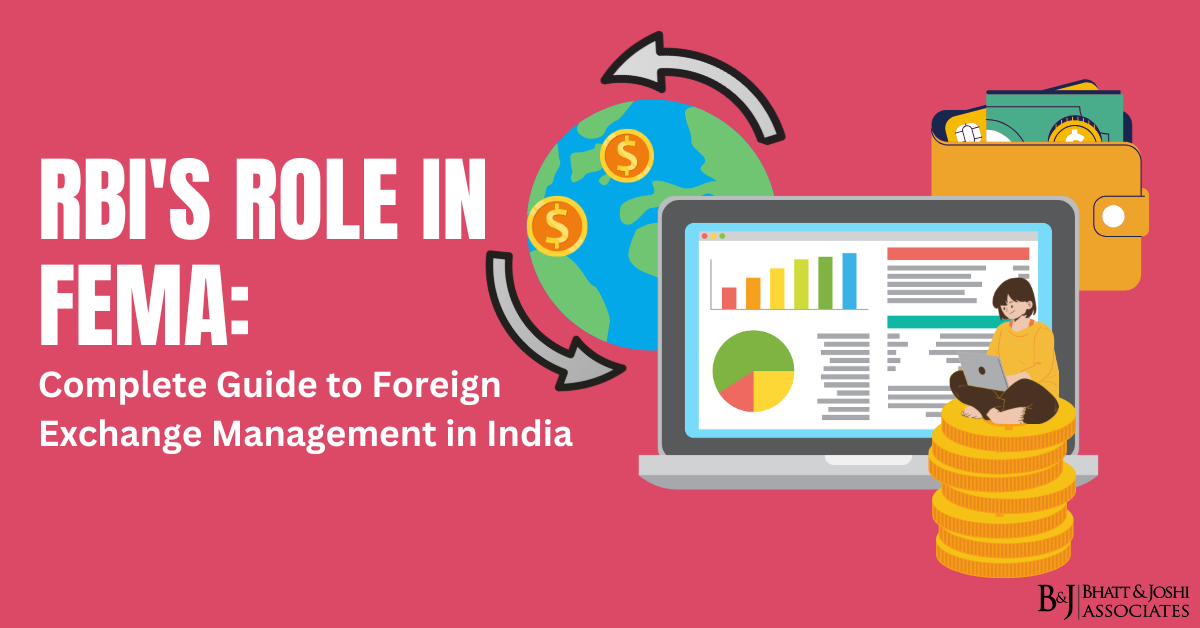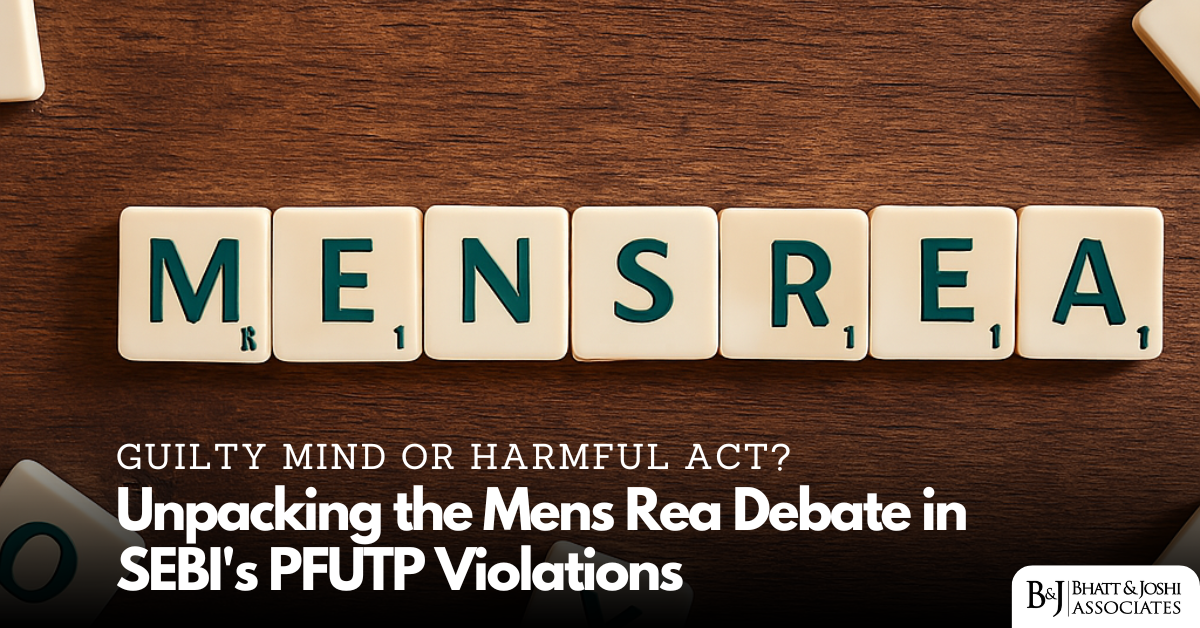Introduction
The Foreign Exchange Management Act, 1999 (FEMA) governs India’s foreign exchange regime, replacing the earlier, more restrictive Foreign Exchange Regulation Act (FERA), 1973. Enacted to facilitate external trade and payments and promote the orderly development of the foreign exchange market, FEMA compliance is essential for all individuals and entities engaged in cross-border transactions. Non-compliance with FEMA provisions, or the rules, regulations, notifications, directions, or orders issued thereunder, constitutes a contravention, potentially leading to significant financial penalties. This article explores the two primary mechanisms for dealing with FEMA contraventions: adjudication and compounding.
Understanding FEMA Contraventions
A contravention under FEMA arises from any violation of the Act or its associated regulations. FEMA regulates transactions involving foreign exchange, broadly categorised as:
- Capital Account Transactions: These alter the assets or liabilities (including contingent liabilities) outside India of persons resident in India, or assets or liabilities in India of persons resident outside India (Section 2(e), FEMA). Restrictions apply as per Section 6 of FEMA and associated regulations.
- Current Account Transactions: These include payments related to foreign trade, services, short-term banking, interest on loans, etc. (Section 2(j), FEMA). While generally permitted, certain transactions may be prohibited or require prior approval from the Central Government or the Reserve Bank of India (RBI) (Section 5, FEMA).
Crucially, dealing in or transferring foreign exchange or foreign securities must typically be done through an “Authorised Person” (like banks, money changers) as defined under Section 2(c) and authorised under Section 10 of FEMA, unless generally or specifically exempted by the RBI.
The Adjudication Process under FEMA
Adjudication is the quasi-judicial process through which alleged FEMA contraventions are formally investigated and decided upon, potentially resulting in penalties.
- Initiation and Investigation by the Directorate of Enforcement (ED)
The ED is the primary agency responsible for investigating suspected FEMA contraventions. Upon forming a belief that a contravention has occurred, the ED conducts an investigation, which may involve summoning individuals, recording statements, and gathering documentary evidence. - Appointment and Jurisdiction of Adjudicating Authorities (AAs)
Under Section 16 of FEMA, the Central Government appoints officers (not below the rank of Assistant Director of Enforcement) as Adjudicating Authorities (AAs) to hold inquiries. The government order specifies their respective jurisdictions. - The Complaint and Show Cause Notice
An inquiry by the AA commences only upon receipt of a written complaint from an authorised ED officer (usually an Assistant Director or Deputy Director) (Section 16(3), FEMA). Before proceeding, the AA must issue a Show Cause Notice (SCN) to the person alleged to have committed the contravention, outlining the specific allegations and providing an opportunity (minimum ten days) to respond and explain why an inquiry should not be held. - The Inquiry Process and Principles of Natural Justice
The person served with the SCN has the right to appear in person or be represented by a legal practitioner or a chartered accountant (Section 16(4), FEMA). The AA has powers akin to a civil court regarding summoning witnesses, compelling document production, etc. (Section 16(5), FEMA). The process must adhere to the principles of natural justice, ensuring a fair hearing, impartial decision-making, and a reasoned order. - Timelines for Adjudication
While FEMA itself does not prescribe a specific time limit for the AA to conclude the adjudication proceedings, legal principles require authorities to act within a “reasonable time.” Undue delay can be challenged. The Supreme Court has held in various contexts that where no limitation period is prescribed, the power must be exercised within a reasonable time, determined by the facts and circumstances of each case (See principle in Govt. of India v. Citedal Fine Pharmaceuticals, Madras, AIR 1989 SC 1771). - Penalties under Adjudication (Section 13, FEMA)
If, after the inquiry, the AA is satisfied that a contravention has occurred, they may impose a penalty as prescribed under Section 13 of FEMA:
- Quantifiable Contraventions: Up to three times the sum involved in the contravention.
- Non-Quantifiable Contraventions: Up to ₹2,00,000 (two lakh rupees).
- Continuing Contraventions: A further penalty of up to ₹5,000 (five thousand rupees) for every day the contravention continues after the date it occurred. It is crucial to note that FEMA contraventions are treated as civil offences. Failure to pay the imposed penalty within 90 days can lead to civil imprisonment under Section 14 of FEMA, read with Section 13(2). Section 13(1C), inserted later, provides for potential criminal prosecution only if a person fails to make payment related to specific high-value trade contraventions after it has been adjudged. This is an exception rather than the norm for FEMA violations.
- Appeals
An order passed by the AA is appealable to the Special Director (Appeals) under Section 17 of FEMA, and subsequently to the Appellate Tribunal for Foreign Exchange under Section 19 of FEMA.
The Compounding Mechanism under FEMA
Compounding offers an alternative route to settle a FEMA contravention by voluntarily admitting the contravention and seeking its resolution through payment of a specified amount, thereby avoiding the lengthy adjudication process.
- Authority and Legal Basis
Section 15 of FEMA empowers the RBI and the Directorate of Enforcement (ED) to compound contraventions specified under Section 13(1) of the Act. The procedure is governed by the Foreign Exchange (Compounding Proceedings) Rules, 2000 (“Compounding Rules”). - Who Can Compound?
Contraventions can be compounded either by the RBI or the ED. The RBI generally handles contraventions relating to specific regulations it administers, such as those concerning Foreign Direct Investment (FDI), External Commercial Borrowings (ECB), Overseas Direct Investment (ODI), establishment of Branch/Liaison/Project Offices, etc. The RBI Master Direction – Compounding of Contraventions under FEMA, 1999 details the contraventions compounded by RBI and the delegation of powers between its Regional Offices and Central Office. The Directorate of Enforcement (ED) handles compounding for contraventions specifically referred to it by the RBI or other contraventions not typically handled by the RBI, such as those involving Hawala transactions or acquisitions of foreign exchange beyond entitlement.
- The Compounding Process
- Application: The person/entity committing the contravention must make a formal application for compounding to the relevant authority (RBI or ED, as applicable) in the prescribed format, along with the requisite fees. The application must include full disclosures regarding the contravention.
- Procedure: The Compounding Authority (CA) examines the application and may call for further information or records (Rule 6, Compounding Rules). The CA must provide the applicant an opportunity of being heard (Rule 7(1), Compounding Rules).
- Timeline: The CA must dispose of the compounding application within 180 days from the date of receipt of the completed application (Rule 7(2), Compounding Rules).
- Compounding Order: If the CA decides to compound, it issues an order quantifying the amount payable. This amount must be paid within 15 days from the order date (Rule 9, Compounding Rules).
- Effect: Once the compounded amount is paid, the contravention is deemed settled, and no further penalty or proceeding can be initiated or continued regarding that specific contravention (Section 15(2), FEMA).
- Discretionary Nature and Limitations
Compounding is not a right but is at the discretion of the Compounding Authority. Compounding may be refused if:
- The contravention is deemed serious, involves issues of money laundering, terror financing, or affects national security/sovereignty.
- The applicant fails to provide necessary information or cooperate.
- An appeal against the AA’s order (under Section 17 or 19) has already been filed concerning the same contravention (Rule 8(1), Compounding Rules).
- Similar contraventions were compounded previously within a three-year look-back period (as per RBI guidelines).
If the compounded amount is not paid within the stipulated time, the compounding order is ineffective, and the contravention reverts to the adjudication process (Rule 9(2), Compounding Rules).
Adjudication vs. Compounding: Key Differences
| Feature | Adjudication | Compounding |
|---|---|---|
| Initiation | By ED via complaint to Adjudicating Authority (AA). | By the contravener via application to RBI/ED. |
| Nature | Quasi-judicial inquiry process. | Administrative settlement process. |
| Outcome | Order by AA imposing penalty (if contravention proven). | Order by Compounding Authority specifying payable amount. |
| Admission | No admission required; finding based on evidence. | Implicit admission of contravention in application. |
| Authority | Adjudicating Authority (appointed under Sec 16). | Compounding Authority (RBI or ED as per Sec 15/Rules). |
| Timeline | No statutory deadline (must be reasonable). | 180 days from application receipt (Rule 7(2)). |
| Appeal | Appealable (Sec 17 – Spl. Director; Sec 19 – Tribunal). | Not appealable once order passed & amount paid. |
| Discretion | AA discretion in penalty quantum (within Sec 13 limits). | CA discretion to allow/reject compounding application. |
| Consequence | Penalty; potential civil imprisonment for non-payment. | Full settlement of the specific contravention upon payment. |
Compliance and Key Considerations
- Due Diligence: Understand all applicable FEMA provisions, rules, and regulations before undertaking any foreign exchange transaction.
- Authorised Channels: Always use Authorised Persons for permissible transactions.
- Documentation: Maintain meticulous records of all cross-border dealings.
- Professional Advice: Consult legal or financial experts specialising in FEMA for complex transactions or compliance queries.
- Timely Action: If a contravention is identified, consider the compounding route proactively, but understand its discretionary nature and prerequisites.
Conclusion
Navigating FEMA requires diligence and a clear understanding of its compliance framework. While contraventions can lead to significant penalties through the adjudication process overseen by the Directorate of Enforcement and Adjudicating Authorities, the compounding mechanism offered by the RBI and ED provides a valuable avenue for voluntary settlement. By understanding these processes, adhering strictly to regulations, maintaining proper documentation, and seeking expert advice when needed, businesses and individuals can effectively manage their foreign exchange dealings and mitigate the risks associated with FEMA non-compliance.
(Disclaimer: This article is for informational purposes only and does not constitute legal advice. Consult with a qualified legal professional for advice specific to your situation.)
References and Citations:
- The Foreign Exchange Management Act, 1999 (Act No. 42 of 1999).
- Section 2: Definitions (Authorised Person, Capital Account Transaction, Current Account Transaction).
- Section 5: Current Account Transactions.
- Section 6: Capital Account Transactions.
- Section 10: Authorised Person.
- Section 13: Penalties.
- Section 14: Enforcement of the orders of Adjudicating Authority.
- Section 15: Power to compound contraventions.
- Section 16: Appointment of Adjudicating Authority.
- Section 17: Appeal to Special Director (Appeals).
- Section 19: Appeal to Appellate Tribunal.
- The Foreign Exchange (Compounding Proceedings) Rules, 2000 (G.S.R. 383(E) dated May 3, 2000, as amended).
- Rule 6: Procedure to be followed by the Compounding Authority.
- Rule 7: Procedure for Compounding.
- Rule 8: Scope and manner of compounding.
- Rule 9: Payment of amount compounded.
- Reserve Bank of India, Master Direction – Compounding of Contraventions under FEMA, 1999 (RBI/FED/2015-16/11 FED Master Direction No.4/2015-16, January 1, 2016, as updated).
- Govt. of India v. Citedal Fine Pharmaceuticals, Madras, AIR 1989 SC 1771 (Illustrative case regarding the principle of exercising power within a reasonable time when no limitation is prescribed).
Article by: Aditya Bhatt
Association: Bhatt and Joshi













